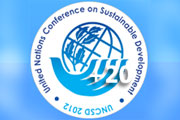The publication outlines why the UNCSD is being held, what it is, ways to participate in its preparations, and how the preparatory process is being organized.
 3 December 2010: The Secretariat for the UN Conference on Sustainable Development (UNCSD, also known as Rio+20) has published a booklet titled “Making it Happen: The United Nations Conference on Sustainable Development, Rio de Janeiro, May 2012.”
3 December 2010: The Secretariat for the UN Conference on Sustainable Development (UNCSD, also known as Rio+20) has published a booklet titled “Making it Happen: The United Nations Conference on Sustainable Development, Rio de Janeiro, May 2012.”
The booklet addresses the following questions: why a conference on sustainable development? what is UNCSD? how to participate? and how will the preparatory process be organized?
On the reasons for the Conference, it underlines the need to “revive the Spirit of Rio.” It notes that the innovations at the Earth Summit in 1992, including the outcome document Agenda 21, are called for today more than they have ever been before, due to economic shocks and resulting social distress, the past decade’s accelerated progress toward development and poverty eradication, and the “emergence of new ideas and leadership.”
On describing UNCSD, the booklet recalls UN General Assembly resolution A/64/236, in which delegates decided that the UNCSD would be organized in 2012 in Brazil, with the following objectives: to secure renewed political commitment to sustainable development, assess progress and gaps in implementation of agreed commitments, and address new and emerging challenges. The publication notes that the Conference has two themes: “a green economy within the context of sustainable development and poverty eradication,” and “the institutional framework for sustainable development.”
On ways to participate in the UNCSD, the Secretariat welcomes contributions from civil society, describes a dedicated website for the Conference, and highlights partnerships with stakeholders. It says the Secretariat aims to facilitate the broadest possible participation during the preparatory process as well as the Conference itself, “building on the tradition established by the Earth Summit.” It notes that the nine categories of civil society organizations recognized in Agenda 21 (known as the Major Groups) have the right to participate. The Major Groups are: Women, Children and Youth, Indigenous People, Local Authorities, Non-Governmental Organizations, Workers and Trade Unions, Business and Industry, Scientific and Technological Community, and Farmers. The booklet notes that voluntary multi-stakeholder partnerships, “a major innovation in sustainable development,” complement but do not substitute for government action or intergovernmental commitments.
On the organization of the preparatory process, the booklet lists the 11 members of the UNCSD Bureau, who are leading the preparatory process. The Bureau is supported by the Secretariat, which is: headed by Conference Secretary General (CSG) Ambassador Sha Zukang; housed in the Department of Economic and Social Affairs (UN-DESA); assisted by two Executive Coordinators (Assistant Secretaries-General), Elizabeth Thompson and Brice Lalonde, as well as the Head of the Office of CSG, Tariq Banuri, and three Special Advisors, Adnan Amin, Nikhil Seth, and Juwang Zhu; and staffed by UN-DESA’s Division for Sustainable Development (DSD) and other entities, under the leadership of Tariq Banuri. In addition to the coordinating role of the UNCSD Secretariat, the Augmented Executive Committee on Economic and Social Affairs (ECESA Plus), chaired by the CSG, allows heads of agencies to oversee coordination. Other existing coordinating bodies, including the UN Development Group and the Environment Management Group, coordinate contributions on their mandated themes. [The Booklet] [UNCSD Website]